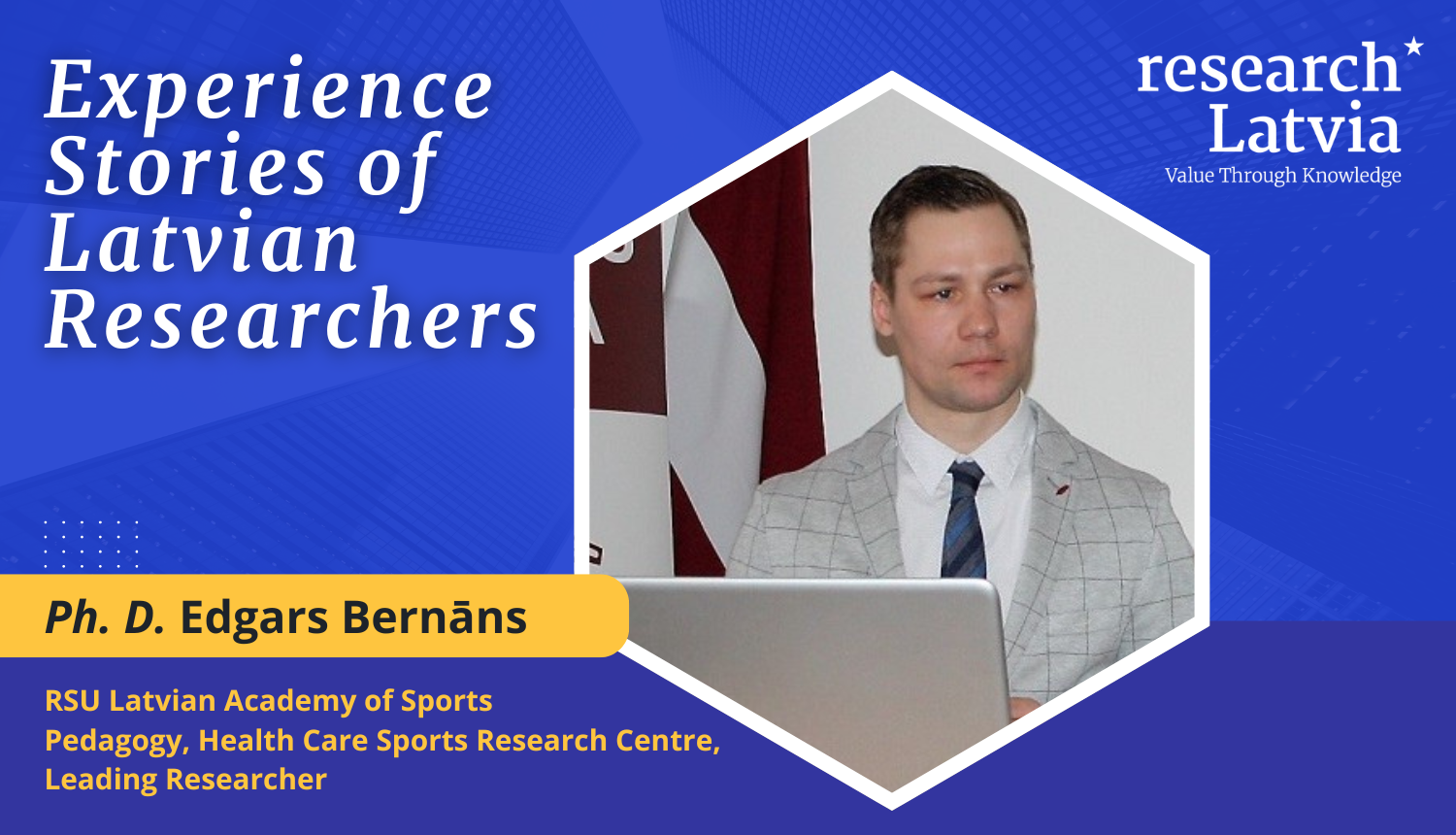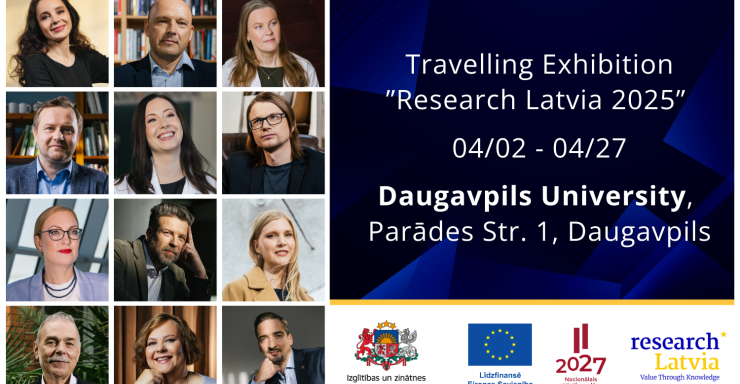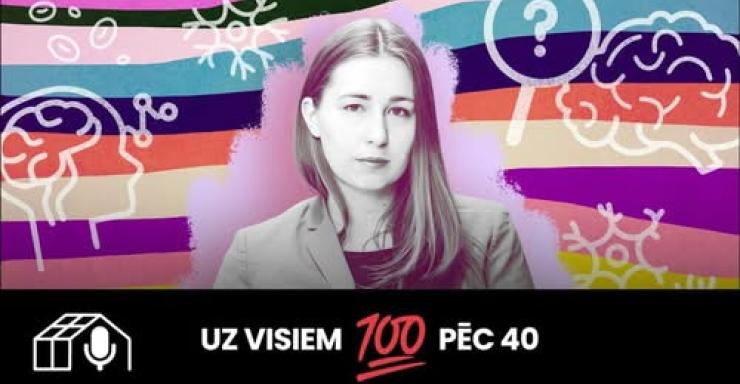Ph. D. Edgars Bernāns is a Leading Researcher at the Latvian Academy of Sport Education (LASE) of Rīga Stradiņš University (RSU). His scientific career is a vivid example of how practical experience and theoretical knowledge can successfully complement each other. His latest research on biomechanics and running efficiency is crucial not only for the sports industry and the development of sports science but also for improving public health. In an interview with the science communication portal researchLatvia, E. Bernāns shares his experience and provides insights into the field of sports science research.
RSU LASE researcher E. Bernāns works daily at the Health Care in Sports Research Center, specializing in the biomechanics of locomotion (coordinated movements that enable spatial movement), physical work capacity assessment, and endurance training processes. His primary focus is on the biomechanics of long-distance running. And for a good reason – E. Bernāns possesses not only a scientific approach but also practical experience, as he continues to participate in local and international cross-country skiing competitions and has worked as a coach. He is also one of Latvia's top roller skiers. One could say that a sports scientist and a practitioner are the same in his case.

E. Bernāns began his journey into science during his professional studies as a sports teacher and coach. He spent much time in the library searching for additional information on sports processes.
"Gradually, I realized that practical experience and coaching were not enough; I needed to understand the theoretical nuances as well," says the sports science doctor. His passion for studying movement biomechanics, training processes, movement analysis, and related aspects motivated him to pursue master's and later doctoral studies.
As the researcher points out, the 1970s and 1980s were significant periods when fundamental research in sports training theory, physiology, and other areas was conducted worldwide. Since that time, RSU LASE (formerly known as the Latvian State Institute of Physical Culture and Latvian Academy of Sport Education) has actively developed scientific activities, making a significant contribution to the advancement of sports science and the implementation of practical research that enhances the understanding of sports processes and the development of more effective training methods.
Edgars' dissertation, defended in 2023, reflects theoretical and practical research on aspects of running economy in long-distance running. "It can be described as the ability to perform movements with minimal energy consumption while maintaining high efficiency – efficiency without compromise," explains the researcher. Under the supervision of RSU LASE Professor Jānis Lanka, several studies have been conducted analyzing the biomechanical characteristics of running and their relationship to the movement economy. Additionally, research has been undertaken on barefoot running and data processing techniques using biomechanical analysis methods in sports. Thanks to this research, practical recommendations have been developed for runners and coaches, along with proposals for further in-depth study of the topic.
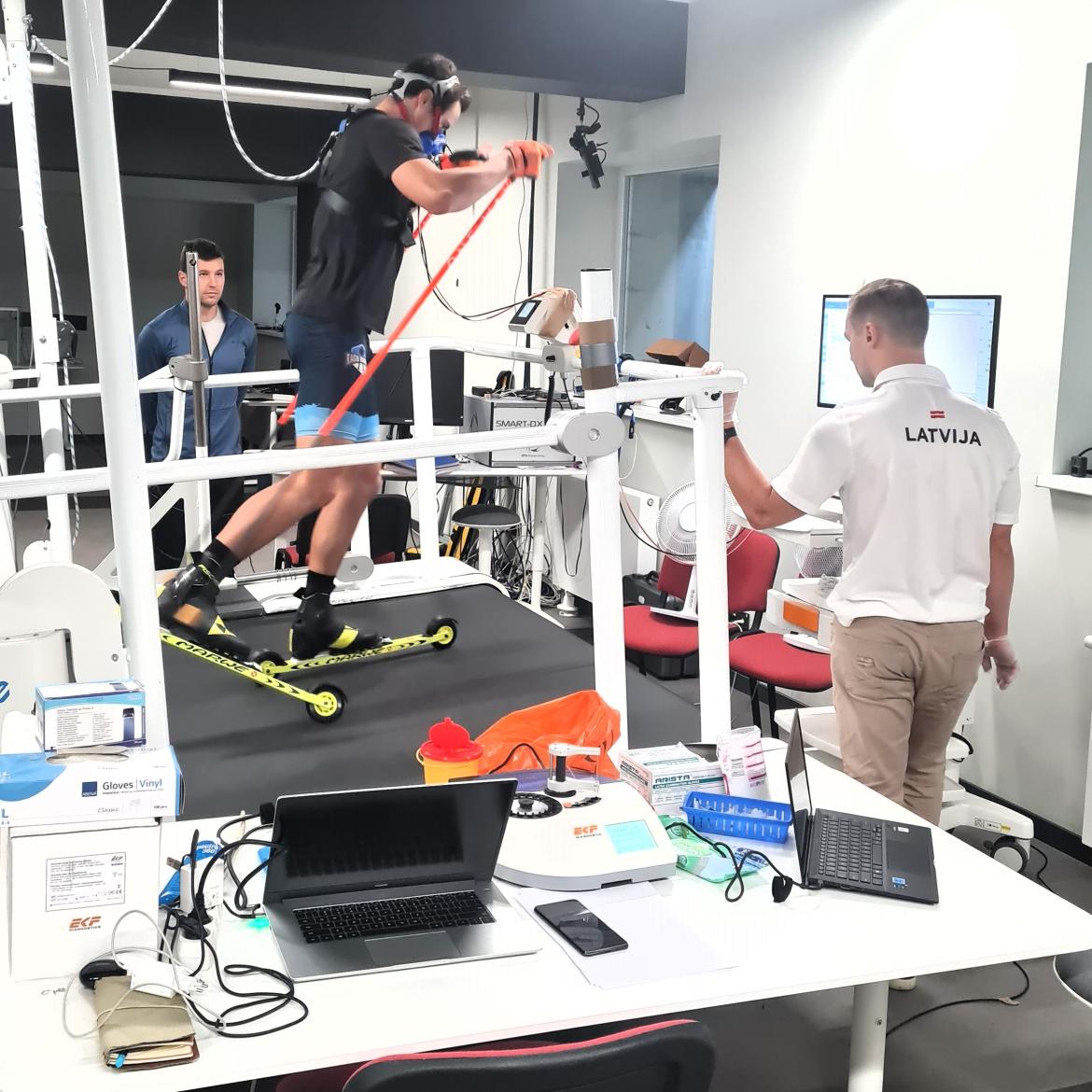
If they can be practically applied, these studies and directions could become some of the first indicators to be integrated into technologies such as smartphones and smartwatches, which help measure our daily activities. The sports science researcher notes: "These devices already partially measure certain indicators, but it is important to develop smarter algorithms that not only provide more accurate answers about whether everything is fine but also adapt to everyone. While the indicators may seem simple, there is still a lack of high-quality data to allow them to be refined and used in adaptive systems."
In sports science, it is difficult to achieve significant results without practical experience and an understanding of sports. Identifying problems or nuances is challenging if you do not grasp the practical side. As I often emphasize – training in sports is a continuous experiment.
There are no guarantees that a particular training program will work, and this often means balancing on the edge of workload limits. Even with excellent knowledge, mistakes are easy to make. For example, athletes overtrain not because they lack knowledge but because they try to balance on the edge, where any minor mistake – an injury or accident – can change the outcome. Practical experience helps to recognize the importance of balancing it with deeper theoretical knowledge.”
Sports science increasingly reveals interdisciplinary applications beyond traditional research aimed at improving elite athletes' performance. The sports field is finding its place in many other disciplines, uncovering new nuances and opportunities that promote sports development on a broader scale. For instance, E. Bernāns is actively involved in the interdisciplinary project Cancerbeat-2, collaborating with medical researchers to adapt physical activities for breast cancer patients to improve their health. Sports science is also advancing in areas such as sports technology, engineering, and national research programs in sports. Additionally, studies related to psychology and pedagogy are being conducted. "One of the most critical issues in Latvia and globally is the lack of physical activity, which is being carefully measured and analyzed. This broader perspective makes sports science more versatile. Although such studies may be less detailed, their importance in promoting public health is immense," E. Bernāns notes.
A scientist’s daily life is multifaceted. “Data collection is a celebration, but most of the work is spent analyzing and writing publications,” the researcher admits.
He pays attention to details and believes that “things become complicated as soon as we try to measure and compare them.” Therefore, Edgars inspires young scientists by emphasizing the importance of perseverance and curiosity in research. For example, every other month, E. Bernāns writes articles for Sporta Avīze, providing readers with a deeper understanding of the nuances and current developments in sports science, thus raising awareness and explaining various sports science issues to a broader audience interested in sports.

"In sports science, you usually identify with a particular sport, being involved both theoretically and practically. Many researchers actively engage in sports alongside their scientific work. For example, when I see people running on the sidewalk without judgment, I evaluate their technique and other details. Similarly, in skiing, I notice nuances that might go unnoticed by others. It's a systematic way of thinking that applies to various aspects of sports. Over time, research has also become a way of life, not limited to working hours. A researcher doesn't work from 8 AM to 5 PM – you may start thinking about research in the morning, and sometimes, like a writer, inspiration strikes in the evening, leading to deep immersion in work late into the night, passionately analyzing data,” shares E. Bernāns.
"First and foremost, there must be a desire to understand the essence of things and an internal researcher's spirit. Curiosity is crucial in research," emphasizes Edgars.
He encourages young people and future scientists not to fear difficulties and to recognize opportunities that will pave the way for new discoveries. "Science in Latvia is developing, and state support is also improving. If you have an internal drive, you can achieve a lot."
With his work, Ph. D. Edgars Bernāns proves that science is not just a collection of theories but also continuous discovery and the application of generated knowledge in practice.
His experience serves as a reminder that scientific work is not confined to laboratories and research centres but extends much further, influencing overall societal well-being and health quality.
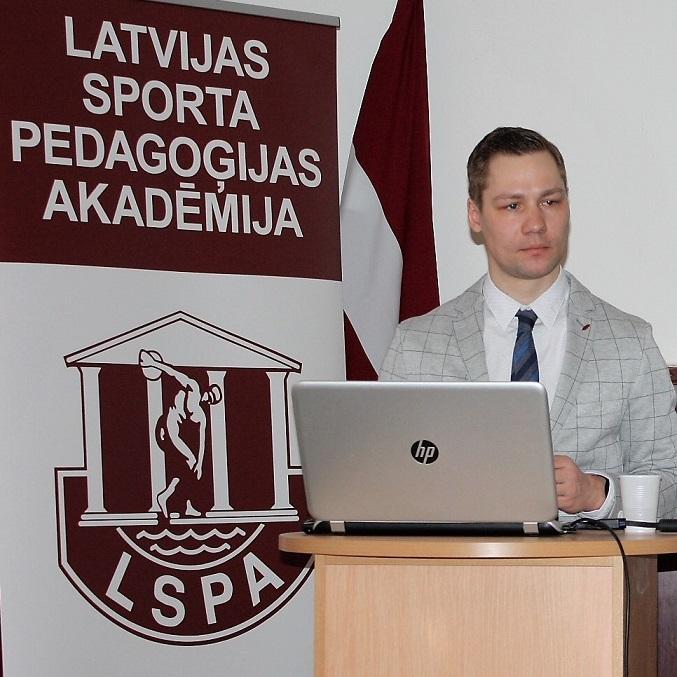
---
About the Series of Articles “Experience Stories of Latvian Scientists”
This article series, created by the communication platform of the Ministry of Education and Science “researchLatvia,” provides insights into the work of Latvian researchers, promoting a deeper understanding of the role of science in society and fostering dialogue between scientists and the broader community.
These stories invite both current and future researchers and the society to explore the achievements of Latvian science and draw inspiration and motivation from the experiences of individuals who have dedicated their careers to scientific endeavors. The interviews are conducted as part of Project No. 1.1.1.1/1/24/I/001 “More Efficient and Smarter Implementation and Management of Latvian Science Policy.”
